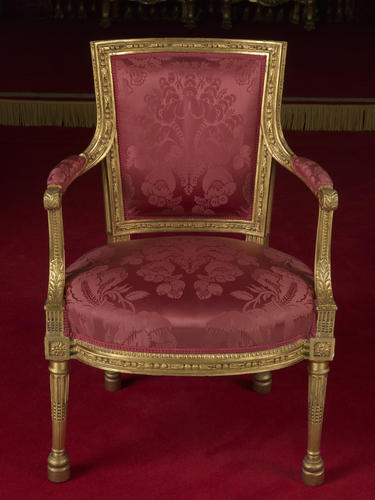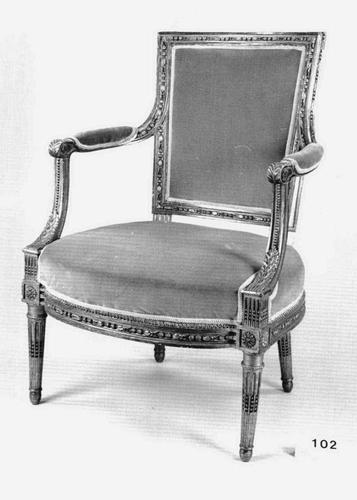-
1 of 253523 objects
Set of elbow chairs c.1775-85
Gilt beechwood, upholstery | 88.3 x 62 x 60 cm (whole object) | RCIN 102
-
Set of 29 elbow chairs of carved and gilded beechwood; slightly curved upholstered rectangular back within bead, husk and foliate borders; slightly scrolled, padded arms with acanthus carving; square blocks above tapering front legs, back legs splayed.
A label attached to one chair is inscribed, 'Monsieur Daguerre / fauteuil courant pour le Sallon' [sic].
These elbow chairs were made by the leading Parisian menuisier or chair and bed-maker, Georges Jacob (1739-1814). They were supplied through the marchand-mercier (dealer-decorator) Dominique Daguerre to the future George IV for use at his London residence Carlton House.
They and four sofas are visible in Charle's Wild's 1818 painting of the Throne Room at Carlton House (RCIN 922178).Provenance
This set was supplied by the French dealer, Dominique Daguerre, employed by George IV when Prince of Wales at Carlton House, c.1787.
Georges Jacob was a prominent Parisian master menuisier, producing carved and painted furniture and upholstery work, becoming a Maître Ebéniste on 4 September 1765. His first business was in the Rue de Cléry from 1767 and the Rue Meslée from 1775 where he employed specialist carvers and gilders. In 1791, the Le Chapelier law removed the guild system and Jacob diversified his workshop to include cabinet-making and mounted bronzes.
Having survived the Revolution with the assistance of the artist Jacques Louis David, Jacob retired in 1796. He left his workshop to his two sons, Georges II and François-Honoré-Georges Jacob-Desmalter who traded as Jacob Frères. After the death of Georges II in 1803 Jacob came out of retirement to work with his younger son; the firm worked on a constant supply of furnishings for the Emperor Napoleon trading as Jacob Desmalter et Cie. -
Creator(s)
(chair maker)(retailer/supplier)(nationality)Acquirer(s)
-
Medium and techniques
Gilt beechwood, upholstery
Measurements
88.3 x 62 x 60 cm (whole object)

